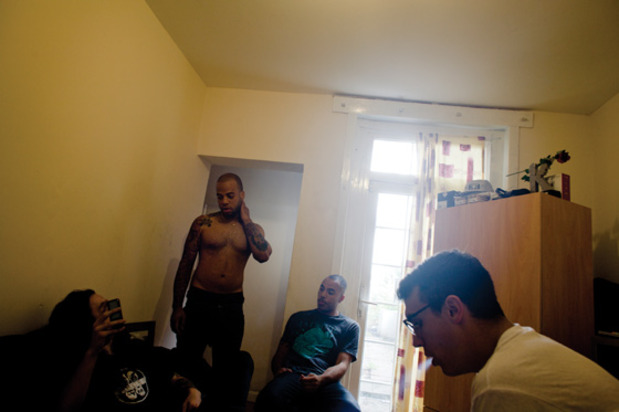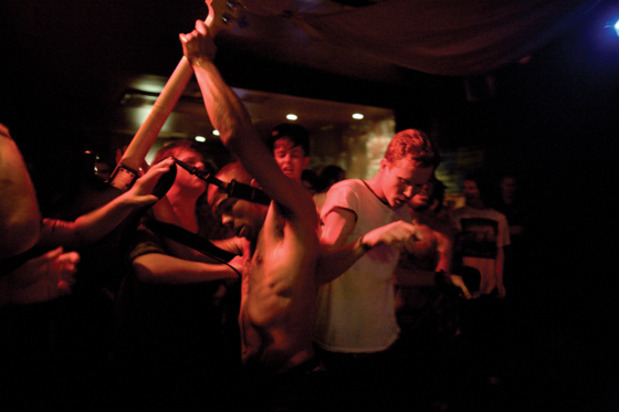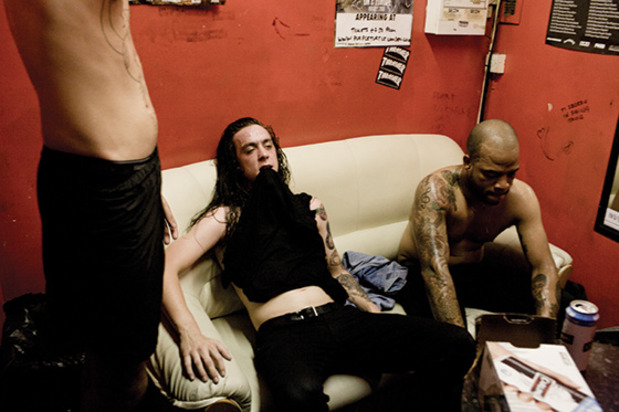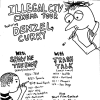JUST AS TRASH TALK GOES ON STAGE at the Purple Turtle, a generally crummy rock club in London, lead singer Lee Spielman stands underneath a crushing flourescent light and pours most of a bottle of water over his head. It looks like a religious rite, a split end baptism, until Spielman says he does it so he doesn’t vomit. “You ever swallow a mouthful of dry hair?” he says. “It’s an automatic puke.” He sits right off stage, bouncing his knee and peeks from behind the curtain. “How’s it look?” The band—drummer Sam Bosson, guitarist Garrett Stevenson and bassist Spencer Pollard—plays the slow, heavy “Hash Wednesday,” a song about taking peyote as sacrament, without him. As it winds down, Spielman bounds on stage and everyone freaks out.
Less than ten minutes later, some kid gets hit in the head with a beer bottle. He tells security and the aggressor gets dragged out. In between songs, Spielman asks who snitched. Trash Talk plays another song at warp speed. Someone throws a pile of napkins in the air like confetti. Someone else launches off the stage, flying horizontally into several faces. Spielman climbs on the bar, flips off that into the crowd. He climbs onto the balcony with the makeshift stripper pole, flips off that into the crowd. Stevenson plays guitar atop a ten-foot totem of wobbly speakers. Spielman asks the horseshoed crowd to come in closer. They do, then immediately retreat when he swings the microphone like a lasso. A kid with a pentagram on his shirt stalks the space in front of the stage, punching the air with a smile. Bosson plays with broken sticks, the songs too fast to grab fresh ones. In the corner, a Trash Talk newbie stands in shock at the site of lots of young men hurting each other for fun. When the set is suddenly done, Spielman thanks the crowd, tells them there’s merch for sale in the back and drops the microphone flat from chest high.
Backstage, Spielman does yoga-like stretches and says he needs weed. Bosson finds some in a white plastic bag and goes to smoke it accompanied by some prep with a tiny mustache. Outside, a superhumanly drunk vagrant pounds a beer he finds in his inside coat pocket, then spits it all up in the gutter. A girl whom at least one member of the band has slept with lurks showing much cleavage. A random dude details how to find naked pictures of her on the internet. Pollard is nowhere to be found because he is, as his band mates say, probably back in the club looking for the woman with the oldest face. She’s certainly not outside leaning against Trash Talk’s enormous white van wearing red lipstick and cutoffs. Those girls are 18. Stevenson is changing in a makeshift dressing room down the street in some fenced-in pen. He doesn’t wear a shirt when he plays. “I gave up on tees,” he says. “Fuck it. I’m fat. I’m over it. It’s not like I’m getting hoes from this shit.” He rejoins the fray, drying his crotch with a leopard print towel.

For a while, Stevenson wasn’t worried about girls on the road, because he was engaged. During one of the many tours of Trash Talk’s five-year history, she walked out, tired of constantly being left alone. He hasn’t seen her since. He no longer has a home of his own, staying at his parents’ when not on tour, which is practically never. He doesn’t have a new girl, either—all four members of the band are single—having replaced love with business. Stevenson is the band’s de facto den mother, handling all of the logistics, as well as running Trash Talk Collective, the record label through which they release their music. In the east of East London apartment they’re occupying for the month of August while they gig around various European festivals, he is the only one with a bedroom to himself, which he keeps mopped and tidy, bed made with fresh roses in a vase. Everyone else sleeps on a knot of sheets two or three to a room, with their friend Mikal sometimes curling up on a pile of clothes in a corner. Leaky, with black water in the toilet and soggy furniture in the backyard, it feels like a squatters’ dorm. The television is always on, usually playing gaudy UK rap videos. In lieu of a closet, one corner has a freestanding cabinet, shoeboxes stacked on top next to a thick silver statuette, their Kerrang award for Best International Newcomer.
Almost 20 years later, Nirvana seems tame compared to Trash Talk.
A slick, stylish rock magazine, Kerrang has embraced Trash Talk for their unpretentious fury, a purity of rage similar in spirit, if not necessarily sound, to the early metal of the magazine’s heyday. Though Kerrang is softening its standards to celebrate Trash Talk, the band has received similar endorsements from the more mainstream music media, especially tastemaking UK rag NME, whose constant support has made the band just as popular, if not more so, in England than it is at home. They’re in a similar place to Nirvana in the early ’90s: a band with a fervid following in a sliver of a scene somehow reaching its tentacles into the mainstream. Compared to much of the flavorless rock popular at the time, Nirvana was horrifying, squalid and angry. They were also too good to be ignored, Kurt Cobain’s indisputable loserdom eventually anointing him a pimply grunge antihero. The music’s overt aggression wasn’t force fed to a wider audience—the audience eventually acclimated to its severity. Almost 20 years later, Nirvana seems tame compared to Trash Talk, though the distance between Trash Talk and pop stardom is much more enormous than the gap Nirvana had to bridge. That could work in their favor. Though it’s unlikely such an abrasive group would find widespread success, with sterile pop and safe rock as its foil and no one really selling any records, Trash Talk’s ferocious energy might find an in if they keep gnashing at the mainstream.
The night after the Purple Turtle, Trash Talk drives north to Nottingham to play the Rescue Rooms, a mega-venue with various stages. Though the crowd is markedly smaller than London, the band performs no less wildly. Spielman focuses much of his energy on the single member of the crowd who looks over 35. He wraps the mic cord around the man’s neck, screaming directly into his face. The old guy loves it. But after the show, Stevenson’s not happy and gathers the band for a combination pep talk and post-mortem. He says Spielman’s talking too much between songs, Bosson missed a bass drum hit. They argue awkwardly but gingerly, shirtless in the big backstage. Spielman fidgets; Pollard stares off impatiently, eager to get back to the girl who came in from Manchester with pot brownies to celebrate his birthday; Bosson, with crisp posture and a sunshine demeanor, listens attentively. The thing is, to the audience, all of Stevenson’s qualms are invisible. Trash Talk live is a blur, 30 minutes of loud, heavy thrash bled together, squeezed out of four men whose nightly catharsis is very nakedly on display. Stevenson’s demand for precision is a surprising priority.

By their own admittance, Trash Talk’s spectacle is nothing new. In 1982, before any of them were alive, Henry Rollins’ iconic Black Flag played a show in Philadelphia. A surviving video of the performance shows the audience baiting singer Henry Rollins, a crowd of angry cats pawing at the stage. Rollins sways, avoiding grabs until he snaps, repeatedly punching the leading agitator in the head. The entire audience cowers. On mention of the scene, Pollard smiles. “He messed that kid up,” he says. “Takes it, takes it, takes it, and then totally goes for it.” Simple pleasure in tension and release is the basis of hardcore, whose abject sound grew out of punk rock in the early ’80s. Whereas punk was mostly fun, hardcore was its harsh cousin, popular with young kids frustrated by Reagan-era politics and America’s burgeoning fascination with modernization, which left much popular culture feeling sterile. The solution was, basically, fast guitars, gurgling bass, blistering drums and a singer willing to shred his vocal chords. Like punk, playing hardcore wasn’t something that necessitated much technical skill: the best bands stood out because of their charisma. As the genre evolved throughout the next two decades, an array of styles under the hardcore umbrella emerged, with northern California, Trash Talk’s home, constantly churning out new incarnations, pungently named subgenres like power violence. Trash Talk’s sound, as it has progressed in the band’s half-decade of releases, has stayed tethered to the basic tenets of speed and aggression. Their lyrics—written by Pollard—revolve around the suburban dystopia familiar to all post-teenagers, multiplied by infinity for social outcasts. On “Sacramamento is Dead,” from their 2007 album Walking Disease, they sing I am not the working son of a working son/ The sun? It never shone on me. “I just felt fucking not right with the kids at my school. Not that I felt more advanced, I just felt like I knew more about the world,” Spielman says. “I wasn’t worried about the homecoming dance or volleyball practice. Those weren’t even fucking on my level of shit that I thought about.” Instead of going to class, Spielman booked shows for traveling hardcore bands in his mid-teens, learning through a constant stream of out-of-towners what he might be missing. This vista to a world outside of Sacramento spurred him, at 17, to start Trash Talk and leave California. In the five years since, they’ve played in Japan, Australia, all of Europe and even Alaska. Being in Trash Talk is like having an extended, traveling semester abroad, only with more stagediving.
In the past year, if only by the unfortunate passage of time, the members of Trash Talk have begun to grow up. Eyes and Nines, their most recent LP, is also their most varied. Though much of it is expectedly blistering, there are moments that skirt around Trash Talk’s hardcore roots. The addition of Bosson three years ago has allowed the music to diversify, his technical and explorative drumming far beyond that of most bands in their lane. “Explode,” which begins with a full bore stampede by Bosson playing at maximum speed, slows briefl y to something approaching radio rock, with Spielman actually singing, I bring you missiles tonight. “Hash Wednesday,” at four and a half minutes, is a sprawling epic for Trash Talk. A slow, Black Sabbath in a paper shredder foundation with Pollard’s low growl above, Jesus is in me/ At a premium price/ I am the body of Christ, the song is genuinely frightening, their sound finally matching their presence onstage.

Aside from Spielman’s obvious mania, that presence, though they dance around it, is undoubtedly bolstered by the basic fact that Pollard and Stevenson are black. Both take a quiet, simple pleasure in knowing that their mere presence in a rock band is disconcerting to some. Sometimes the discomfort veers fully into disbelief. In one case, a bouncer went so far as to bar Stevenson from entering his own band’s sold out show because he did not have a ticket. “I had 60 kids behind me laughing at the security guard, and he was still like, No, you can’t come in,” he says. “I had to wait for the manager to come out to talk to the dude so I could get in the fucking club.” All four members of the band, though Stevenson most often, have constant troubles with bouncers, though it rarely turns physical. Hatred of authority has been ingrained in punk and hardcore culture so long it’s settled into a harmless shadowbox. The standoff seems pointless, until you realize that for a band like Trash Talk, life is 99% freedom, so the 1% of it they spend onstage, in a space sanctioned by some faceless authority’s rules, is wholly about breaking them. Offstage, the members of Trash Talk are well-traveled, mostly polite, incredibly warm—you could bring them home to your mother. But you would never in a million years bring your mother to a Trash Talk show. As they age, that rift between their day to day and their stage show will only continue to grow, adult responsibilities eventually trumping their current freewheeling. But maybe their own recognition of calming down off stage will lead them to greater and wilder extremes on it.
For a band like Trash Talk, life is 99% freedom, so the 1% of it they spend onstage, in a space sanctioned by some faceless authority’s rules, is wholly about breaking them.
The night after Nottingham, Trash Talk make the slow drive in light rain out of London to Southampton, a city known for being the Titanic’s launching point. Unfortunately, there is another hardcore show in town and attendance is low. Just before they go on, a short bearded kid repeatedly pounds the floor with his foot like he is trying to break a hole in an icy pond. He later says he has planned his European backpacking trip around this show. He barely speaks English. In the middle of the set, during “Sacramento is Dead,” Spielman hands off the microphone to Trash Talk’s tour manager and friend Adam Rossiter to fill in on vocal duties during the song’s latter half. Rossiter is swarmed by the crowd, disappearing into what looks like a frothing group hug. Somewhat drunk, Spielman heads past security through the back door to vomit. He may have swallowed some hair. If they notice, the rest of his band don’t let on. With the crowd distracted, Stevenson crosses the floor to Pollard’s side and pins him against the wall with his head. It looks violent, teeth bared and sweat everywhere. Then they start laughing.



